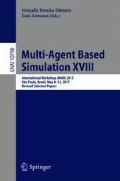Abstract
We consider an adaptation of Axelrod’s metanorm model, where a population of agents choose between cooperating and defecting in bilateral interactions. Because punishing incurs an enforcement cost, Axelrod proposes using metanorms, to facilitate the stability of a norm of punishing defectors, where those who do not punish defectors can themselves be punished. We present two approaches to study the social effects of such metanorms when agents can choose their interaction partners: (a) a theoretical study, when agent behaviors are static, showing stable social configurations, under all possible relationships between system parameters representing agent payoffs with or without defection, punishment, and meta-punishment, and (b) an experimental evaluation of emergent social configurations when agents choose behaviors to maximize expected utility. We highlight emergent social configurations, including anarchy, a “police” state with cooperating agents who enforce, and a unique “corrupt police” state where one enforcer penalizes all defectors but defects on others!
This paper has already been published in: \(\copyright \) Springer International Publishing AG 2017 G. Sukthankar and J. A. Rodriguez-Aguilar (Eds.): AAMAS 2017 Visionary Papers, LNCS 10643, pp. 31–44, 2017. https://doi.org/10.1007/978-3-319-71679-4_2
Access this chapter
Tax calculation will be finalised at checkout
Purchases are for personal use only
References
Airiau, S., Sen, S., Villatoro, D.: Emergence of conventions through social learning. Auton. Agents Multi-agent Syst. 28(5), 779–804 (2014)
Axelrod, R.: An evolutionary approach to norms. Am. Polit. Sci. Rev. 80, 1095–1111 (1986)
Baetz, O.: Social activity and network formation. Theor. Econ. 10(2), 315–340 (2015)
Barabasi, A.: Network Science. Cambridge University Press, Cambridge (2016)
Belardinelli, F., Grossi, D.: On the formal verification of diffusion phenomena in open dynamic agent networks. In: Proceedings of the 2015 International Conference on Autonomous Agents and Multiagent Systems, AAMAS 2015, pp. 237–245. International Foundation for Autonomous Agents and Multiagent Systems, Richland (2015)
Berninghaus, S., Vogt, B.: Network formation and coordination games, March 2003
Borge-Holthoefer, J., Baos, R.A., Gonzlez-Bailn, S., Moreno, Y.: Cascading behaviour in complex socio-technical networks. J. Complex Netw. 1(1), 3–24 (2013)
Brooks, L., Iba, W., Sen, S.: Modeling the emergence and convergence of norms. In: IJCAI, pp. 97–102 (2011)
Cha, M., Haddadi, H., Benevenuto, F., Gummadi, K.P.: Measuring user influence in Twitter: the million follower fallacy. In: Proceedings of International AAAI Conference on Weblogs and Social in ICWSM 2010 (2010)
David, E., Jon, K.: Networks, Crowds, and Markets: Reasoning About a Highly Connected World. Cambridge University Press, New York (2010)
Delgado, J.: Emergence of social conventions in complex networks. Artif. Intell. 141(1–2), 171–185 (2002)
Epstein, J.M.: Learning to be thoughtless: social norms and individual computation. Comput. Econ. 18(1), 9–24 (2001)
Galán, J.M., Łatek, M.M., Rizi, S.M.M.: Axelrod’s metanorm games on networks. PLOS ONE 6(5), 1–11 (2011)
Mahmoud, S., Miles, S., Luck, M.: Cooperation emergence under resource-constrained peer punishment. In: Proceedings of the 2016 International Conference on Autonomous Agents & #38; Multiagent Systems, AAMAS 2016, pp. 900–908. International Foundation for Autonomous Agents and Multiagent Systems, Richland (2016)
Peleteiro, A., Burguillo, J.C., Chong, S.Y.: Exploring indirect reciprocity in complex networks using coalitions and rewiring. In: Proceedings of the 2014 International Conference on Autonomous Agents and Multi-agent Systems, AAMAS 2014, pp. 669–676. International Foundation for Autonomous Agents and Multiagent Systems, Richland (2014)
Ranjbar-Sahraei, B., Bou Ammar, H., Bloembergen, D., Tuyls, K., Weiss, G.: Evolution of cooperation in arbitrary complex networks. In: Proceedings of the 2014 International Conference on Autonomous Agents and Multi-agent Systems, AAMAS 2014, pp. 677–684. International Foundation for Autonomous Agents and Multiagent Systems, Richland (2014)
Savarimuthu, B.T.R., Cranefield, S., Purvis, M., Purvis, M.: Norm emergence in agent societies formed by dynamically changing networks. In: Proceedings of the 2007 IEEE/WIC/ACM International Conference on Intelligent Agent Technology, IAT 2007, pp. 464–470. IEEE Computer Society, Washington (2007)
Sina, S., Hazon, N., Hassidim, A., Kraus, S.: Adapting the social network to affect elections. In: Proceedings of the 2015 International Conference on Autonomous Agents and Multiagent Systems, AAMAS 2015, pp. 705–713. International Foundation for Autonomous Agents and Multiagent Systems, Richland (2015)
Tsang, A., Larson, K.: Opinion dynamics of skeptical agents. In: Proceedings of the 2014 International Conference on Autonomous Agents and Multi-agent Systems, AAMAS 2014, pp. 277–284. International Foundation for Autonomous Agents and Multiagent Systems, Richland (2014)
Villatoro, D., Andrighetto, G., Sabater-Mir, J., Conte, R.: Dynamic sanctioning for robust and cost-efficient norm compliance. In: Proceedings of the Twenty-Second International Joint Conference on Artificial Intelligence - Volume Volume One, IJCAI 2011, pp. 414–419. AAAI Press (2011)
Villatoro, D., Sen, S., Sabater-Mir, J.: Topology and memory effect on convention emergence. In: IAT (2009)
Acknowledgments
We would like to thank the University of Tulsa and in particular the Tulsa Undergraduate Research Challenge (TURC) for financial support of this project.
Author information
Authors and Affiliations
Corresponding author
Editor information
Editors and Affiliations
Rights and permissions
Copyright information
© 2018 Springer International Publishing AG, part of Springer Nature
About this paper
Cite this paper
Beckemeyer, N., Macke, W., Sen, S. (2018). Stable Configurations with (Meta)Punishing Agents. In: Dimuro, G., Antunes, L. (eds) Multi-Agent Based Simulation XVIII. MABS 2017. Lecture Notes in Computer Science(), vol 10798. Springer, Cham. https://doi.org/10.1007/978-3-319-91587-6_3
Download citation
DOI: https://doi.org/10.1007/978-3-319-91587-6_3
Published:
Publisher Name: Springer, Cham
Print ISBN: 978-3-319-91586-9
Online ISBN: 978-3-319-91587-6
eBook Packages: Computer ScienceComputer Science (R0)

